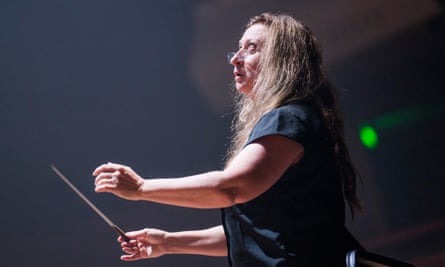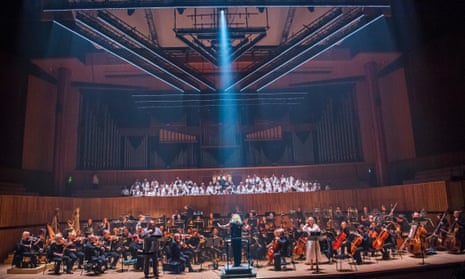With the Meat Loaf musical taking over the English National Opera’s home at the Coliseum for the summer, the opera company itself has gone on the road. Two performances of Elgar’s The Dream of Gerontius across the river at the Royal Festival Hall are part of ENO’s peripatetic mix of projects in other parts of London, with this one also forming part of the Southbank Centre’s own Chorus festival.
It is hard to attempt a staging of Cardinal Newman’s poem about a dying man, not least because of the considerable challenge of the brief appearance of God in part two. The ENO’s version was nevertheless billed as a staging, by Lucy Carter. Carter sensibly took a minimalist approach, not requiring the singers to act, creating instead a lighting show whose responses to the score were a bit predictable.
Nevertheless Gerontius owes a lot to opera, especially Wagner’s Parsifal. And Elgar was often tempted by opera, exploring collaborations with no less than Thomas Hardy and George Bernard Shaw. To the extent that this performance of Gerontius was distinctively operatic, this lay in the music, of which the experienced opera conductor Simone Young gave an account that consistently emphasised the drama in the score rather than the work’s ruminative tradition.

Young’s grip on the evening hardly wavered across the two parts of the score, which were played with with only a small pause between them. She favoured quicker speeds than many conductors, but her long experience in the music of composers such as Wagner and Bruckner shone through in the persuasive architectural sense she brought to the score. Young’s strict control of the work’s orchestral dynamics also allowed the soloists to be heard without the vocal strain that often marks Gerontius performances. As with her appearance at the Proms last year conducting Zemlinsky, this was a reminder that Young’s very considerable talents have been too neglected in this country.
Gwyn Hughes Jones brought plenty of ardour, ringing sound and emotional conviction to the hugely demanding tenor role of Gerontius himself. Matthew Rose’s rich-toned priest and Patricia Bardon’s angel were both very fine indeed and gave wholly engaged renderings of their solos. The ENO chorus, joined by the BBC Singers, were incisive and dramatic. The only disappointment of the evening was that, on leaving the hall, the sounds of Elgar were immediately assailed by other events elsewhere in the building. The Southbank management should show more aesthetic sensitivity to its classical audience.

Comments (…)
Sign in or create your Guardian account to join the discussion